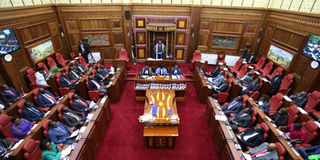Senate will lose ‘fight against people of Kenya’

Senate Speaker Ekwee Ethuro leading proceedings on February 4, 2014. FILE PHOTO | BILLY MUTAI |
What you need to know:
- Power play: Senators are keen on asserting their authority but, in doing so, they are rubbing everyone else the wrong way.
- A pesa mashinani referendum will trash and thrash the Senate and national government.
The Senate boasts some of the best brains in Kenya today. That is as it should be because the House was not only created to protect the interests of the counties and their governments, but also because it is supposed to help oversee the transition from centralised to devolved governance.
It is also important that these brains are in the Senate because transitions are normally volatile periods that call for reasoned, thoughtful and sober analysis and reaction.
The challenge, however, is that however well intentioned the framers of the Constitution were, the Senate appears to be the weaker institution when compared to the National Assembly.
That is dangerous because we are here talking about weakness in regard to political power and about an institution whose principal role is that of making the law.
A weak individual or institution may attempt to make up for this handicap by flexing muscles, usurping roles or rebelling. The Senate appears keen to enact laws to give it more powers in order to assert itself.
Again, no matter how well meaning the framers were, they may not have envisaged a scenario where the Houses would be in fierce competition which would at times spawn contempt and downright hostility.
SENATE EMBEDDING ITSELF
The other challenge of the creation of the Senate is manifesting itself in the emotive and explosive differences between the lawmakers and the governors.
The Senate is a national institution with national responsibilities whereas county governments are local entities. But now the Senate is embedding itself in county (local) boardrooms.
Witness this: Senators amended and passed the County Allocation Revenue Bill. If it becomes law, it will limit revenue allocations to recurrent expenditure to 40 per cent and increase that for development programmes to 60 per cent.
The problem is this: The 60 per cent will be the responsibility of recently-created County Development Boards (CDBs) chaired by Senators.
The way most people understand it is that governors were elected to be the chief executives of their counties and the constitutional mandate of the Senators is that of considering, debating and approving Bills concerning counties.
So, argue Senators, creating the CDBs, making Senators the chairmen and governors the secretaries and limiting cash controlled by governors, is perfectly legal and in the interest of counties.
Why? Because, the Senators say, this is again part of their constitutional mandate of oversight over national revenue allocated to the counties.
So, when governors cry foul at this arrangement, Senators charge that the former are refusing to be held accountable for the way they have used public money. They accuse them of covering up their malpractices.
RAISED AUDIT QUERIES
What gave rise to this Bill and CDBs? The Controller of Budget has raised audit queries about the use of revenue by counties and Senators deemed it fit to summon respective governors to answer them. Governors, among them Mr Isaac Ruto — the chairman of the Council of Governors — refused to appear before the Senators. Mr Ruto sent representatives.
The contentious CDBs and Bill were born. When governors said they will not attend CBD meetings, Senators swiftly asked the Treasury to deny four counties funds until their governors appeared before them. In retaliation, the idea of a referendum to determine how much money counties should get, which the governors mooted and shelved, was revived with zeal.
The governors want Kenyans to decide, once and for all, the matters of revenue allocation and force the national government to commit itself to supporting devolution.
In other words, governors see the national government as working to kill devolution. They tie the recent moves by the Senate to attempts by the national government to fight devolution.
The national government must not fight devolution for one reason alone — it will be taking on the people of Kenya and their Constitution. In taking on the governors and seeking to deny counties funds just to flex its newfound power, the Senate is taking on the people of Kenya and their Constitution. Senators will lose this fight.
Get it right; governors are not opposed to the Senate exercising its oversight function. They are not refusing to be held accountable for their expenditures and acts of commission and omission. Governors are opposed to the way the Senate is imposing itself on the counties and its drive to clip their wings.
A pesa mashinani referendum will trash and thrash the Senate and national government. (READ: The referendum fever)
Opanga is a media consultant; [email protected]




